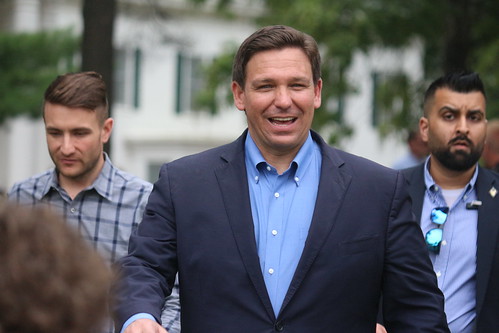DeSantis top aide grilled over map that dismantled seat held by Black Democrat
DeSantis #DeSantis

During his lengthy testimony, Kelly faulted past rulings by the Florida Supreme Court related to redistricting, questioned how the Legislature handled redistricting at times and made comments that appeared at odds with statements he made in his own depositions.
Kelly also insisted that the map that DeSantis has recently touted on the campaign trail as helping Republicans win the House last year was not drawn for “partisan” reasons or to help any incumbents — factors that are not allowed under Florida’s voter-approved anti-gerrymandering standards.
In one notable exchange, Kelly also insisted to one of the lead lawyers questioning him that he had no idea that he was bolstering the percentage of white voters in four districts by splitting up the seat that had been held by Rep. Al Lawson.
“I had no reason to look at racial and ethnic data in North Florida,” Kelly testified.
The ongoing federal trial is separate from a different legal challenge in state court, although both primarily focus on Lawson’s dismantled seat. In the state case, a Florida circuit judge ruled earlier this month that the redrawn district violates the state’s Constitution and ordered the GOP-led Legislature to create a new map. That ruling has been appealed and will be taken up by a state appeals court later this fall.
The scope of the state lawsuit was narrowed right before trial and was confined to a single day of legal arguments and no witness testimony.
Lawyers representing the groups and individuals suing in federal court — which includes the democracy advocacy organization Common Cause and NAACP — plan to bring in experts to talk about Florida’s history and whether it can be shown that what the governor did was discriminatory, although there won’t be much direct evidence that delves into the behind-the-scenes machinations.
Instead, the legal battle is focusing on DeSantis’ unusual decision to insert himself into the redistricting process by offering up his own maps and then vetoing the initial proposal by the Republican-dominated Legislature that would have preserved a Jacksonville-based district where Black voters would have remained a substantial minority. DeSantis’ general counsel at the time contended that this district diluted Black voting power too much.
Kelly on Tuesday was asked about DeSantis’ motivations for pushing the map despite the initial reluctance of the Legislature. DeSantis had argued that Lawson’s old district — which stretched roughly 200 miles from Jacksonville to just west of Tallahassee — violated the U.S. Constitution’s equal protection clause.
U.S. District Judge M. Casey Rodgers, an appointee of former President George W. Bush, pressed Kelly to cite a court ruling that backed up DeSantis’ argument that Lawson’s former district was unconstitutional. Kelly acknowledged that he didn’t know.
When it was pointed out by the plaintiffs’ attorneys that the Florida Supreme Court had established Lawson’s district in 2015 by determining the Legislature back then violated the state’s Fair Districts amendment, Kelly responded at least two times that the “Florida Supreme Court got it wrong.”
Kelly made this assertion even though, in a June deposition he gave in the state case, he said that he had not read the 2015 Florida Supreme Court decision that resulted in the creation of the seat. When asked about this outside the courtroom, Kelly responded that “reading” the entire ruling is “different than understanding that the result was wrong.”
Kelly also said there were times that he did think the Legislature’s initial analysis about redistricting was not “reasonable” and he was not pleased with how lawmakers treated an expert who was brought in to defend the governor’s proposal at a legislative hearing.
Kathay Feng, Common Cause vice president for programs who was on hand for the trial, contended that Kelly’s testimony showed that the DeSantis administration was struggling to explain their actions.
“There’s a lot of twisting and turning, there’s a lot of fabrication, there’s a lot of denial of history,” Feng said.